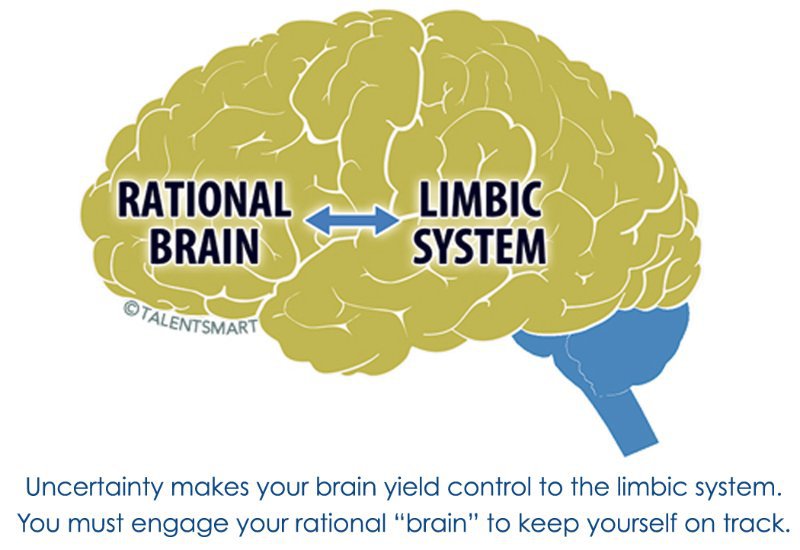#Leadership : The Three Biggest Leadership Mistakes I Made In 2017, And How I’ll Fix Them In 2018… Mistake #2: I Allowed my Stress and Anxiety to Set the Tone for the Organization
For years, I’ve preached the value of self-awareness to anyone who will listen. Whether in your personal or professional life, the ability to confront your strengths and weaknesses head-on is essential for personal growth.
Now that we’re starting a new year, it’s a perfect time to take a moment and reflect on the mistakes we’ve made in the past and how we can fix them going forward.
For me, 2017 was a wild year, full of the highest of highs and the lowest of lows. It was, perhaps, the most transformational year in my company’s history.
Over the past 365 days, we have closed down old product lines, merged with another company, shifted industries, divested business lines, hired and fired people, recapitalized the business, and launched all new products.
Throughout all of this, I’ve seen my role as CEO evolve from a technology startup founder to the leader of a complex, multi-channel business.
With so many things happening in such a short period, it’s easy to get lost in the hustle and lose perspective.
That’s why I’ve spent the last couple of weeks reflecting on my performance over the year. I want to call out the mistakes I’ve made, share them with the world, and explore how I’ll fix them in 2018.
Mistake #1: In trying to empower my team, I adopted a hands-off management style.
I was just 24 years old when my co-founder and I started BodeTree, and the only thing that exceeded my lack of knowledge was my arrogance.
I had found a fair bit of success in my career up to that point and as a result felt that I knew everything I needed to know about leadership.
In reality, I knew hardly anything about true leadership. In fact, I was a bull in a china shop when it came to managing people. I forced my opinion on others, closed myself off from criticism, and dictated plans from upon high.
It didn’t work.
I owe a lot to my co-founder and mentor who finally pulled me aside and helped me to understand the error of my ways. From that time on, I took measures to listen to others, let them take the lead, and adopt a much more gentle leadership style.
Like everything in life, however, problems arise when the pendulum swings too far in any one direction.
Throughout this past year of change, I wanted to do everything I could to ensure a smooth transition and integration. The best way to do that, I reasoned, was to adopt a gentle, hands-off leadership style with the hopes of empowering my team’s leaders.
The problem was that this hands-off style doesn’t equate to empowerment.
Empowerment is about giving people the guidelines, accountability, and resources to achieve the team’s goals. Sitting back and letting people run in their direction doesn’t do them any favors. In fact, it causes organizations to diverge in an ever-accelerating cycle of frustration.
My goal for 2018 is to bring my leadership style into balance. This entails taking a more hands-on approach to empowerment, serving as a coach and coordinator for the leaders on my team.
There’s nothing hands-off about it; I’ll be involved in every step, supporting, encouraging, and holding people accountable.
Like this Article ? Share It ! You now can easily enjoy/follow/share Today our Award Winning Articles/Blogs with Now Over 2.5 Million Growing Participates Worldwide in our various Social Media formats below:
FSC LinkedIn Network: www.linkedin.com/in/fscnetwork
Facebook: http://www.facebook.com/pages/First-Sun-Consulting-LLC-Outplacement-Services/213542315355343?sk=wall
Google+: https://plus.google.com/115673713231115398101/posts?hl=en
Twitter: Follow us @ firstsunllc
Question: Want the ‘the best/current articles/blogs on the web’ on Job Search, Resume, Advancing/Changing your Career, or simply Managing People?
Answer: Simply go to our FSC Career Blog below & type(#career, #leadership, #life) in Blog Search: https://www.firstsun.com/fsc-career-blog/
What Skill Sets do You have to be ‘Sharpened’ ?
Continue of article:
Mistake #2: I allowed my stress and anxiety to set the tone for the organization
Change and stress go hand-in-hand, and in 2017 our organization experienced its fair share of change. To say that it was a stressful year would be an understatement.
Leaders set the tone for the organization. As I’m writing this, I have a list on my desk with two columns. The first column is the list of positive and exciting opportunities we have in front of us. The second column is the list of things that terrify me.
As the leader of my organization, I get to choose which column we focus on. Last year, I allowed the stress and anxiety I was facing to leak into the company at large.
I wore my emotions on my sleeve, and as a result, unconsciously chose to focus on the negative aspects of our situation – the risks, fears, and uncertainty – rather than the tremendous opportunity in front of us.
Since I was fearful and stressed, the rest of the team followed suit. This caused a bit of a self-fulfilling prophecy. Since we focused on the negative, it seemed as though negative things happened.
Fortunately, the opposite also holds true. When we focused on positive things, miraculously it seemed as though positive things happened.
Morale has a certain momentum to it inside of organizations. You fall in the direction you lean, so it’s important always to be aware of how you’re leaning.
In 2018, I’m personally committing to controlling my emotions better and focusing on the positive things in front of us. I know that if I lean toward the light, my team will as well.
Mistake #3: I focused on long-term strategy and neglected near-term tactics
I come from a background in finance and strategy, and as a result, I tend to focus on the “big picture.”
My co-founder and I share this trait. We jump to the conclusion quickly, but often fail to pay attention to the tactical steps that are needed to reach said conclusion.
This past year, I focused on the potential that our newly-combined business had to bring about massive change to the franchising industry. However, I underestimated just what it would take for us to achieve this ambitious goal.
Strategy is great, but it is worthless without tactics. The devil is in the details, and it’s important to focus on the day-to-day operational tactics if there is to be any hope of bringing strategy to bear.
Going forward into 2018, I’m going to spend my time focusing on the tactical aspects of executing against our strategy, while my co-founder will keep an eye toward the future.
The path forward
2017 was a difficult year in many respects, but the adversity and uncertainty we faced transformed me into a more mature leader.
I’m finally finding the balance I’ve sought after for so long. BodeTree is no longer the scrappy tech startup; instead, it’s a complex, deep, and multi-faceted business that requires a more mature leadership style.
Honestly reflecting on the mistakes I’ve made is the first step toward becoming the leader that my organization needs.
I don’t know what 2018 has in store for us, but I know one thing for sure; I won’t be repeating the mistakes of the past.
Author:Chris Myers is the Cofounder and CEO of BodeTree and the author of Enlightened Entrepreneurship.
Forbes.com | January 1, 2018




